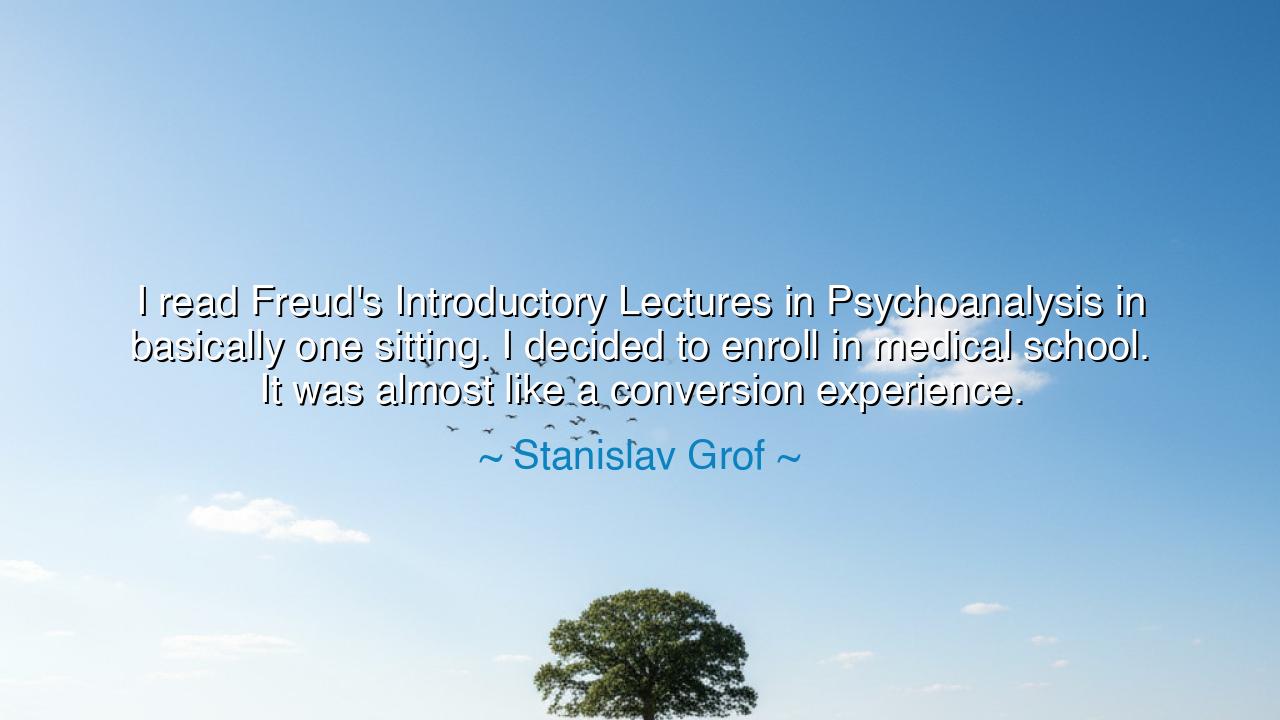
I read Freud's Introductory Lectures in Psychoanalysis in
I read Freud's Introductory Lectures in Psychoanalysis in basically one sitting. I decided to enroll in medical school. It was almost like a conversion experience.






Hearken to the words of Stanislav Grof, a seeker whose life was transformed in a single breath of insight, as though the heavens themselves whispered truth into his eager mind. He recounts that he read Freud’s Introductory Lectures in Psychoanalysis in one sitting, and in that unbroken communion with knowledge, he felt the tremor of destiny. Like the sudden illumination of a torch in a darkened hall, his purpose became clear: he would enroll in medical school, devote himself to understanding the human soul and body, and step onto the path of healing. This moment, as he declares, was almost like a conversion experience, a profound awakening that redirected the currents of his life.
From the annals of history, we find kindred tales of such transformations. Consider the Apostle Paul, once a persecutor of those who followed the way of compassion and justice, struck by a vision on the road to Damascus. In an instant, his beliefs and purpose were transfigured, and he became a fervent messenger of mercy. So too did Grof experience a sudden alignment of intellect and destiny, a rare and luminous clarity that revealed the work he was meant to undertake. It is a reminder that the human spirit, when stirred by insight and knowledge, can leap beyond the ordinary into a realm of higher calling.
Freud’s writings, as Grof discovered, are more than mere words on a page; they are portals into the hidden chambers of the mind. To read them in one sitting is to surrender fully to a dialogue with the unconscious, to confront the mysteries of desire, fear, and the soul’s inner architecture. Grof’s experience exemplifies the power of intellectual passion and immersion—how a single encounter with truth can awaken latent purpose. It is the ancient lesson of scholars and mystics alike: wisdom must be sought with hunger, with devotion, and with courage to be transformed.
Grof’s story mirrors the journeys of countless seekers whose lives pivot upon the discovery of a single text or idea. Consider the Renaissance polymath, Leonardo da Vinci, whose encounter with the works of classical antiquity ignited a lifelong pursuit of understanding in art, anatomy, and engineering. In each case, the spark of knowledge kindles a fire that reshapes identity, revealing a calling that had previously lain dormant. Conversion is not always religious; it is the soul’s recognition of its truest work, the awakening to one’s vocation in the symphony of existence.
Yet Grof’s revelation was not merely intellectual—it was deeply personal and moral. The decision to enter medical school signifies a commitment to serve, to bridge understanding between the mind and body, and to honor the fragile human condition. In ancient terms, he embraced the role of the healer, the one who applies knowledge not for mere prestige or gain, but to ameliorate suffering and illuminate truth. This is the lesson that the wise have long imparted: knowledge without action is but a shadow; it is in its application that greatness is forged.
History teaches us that such transformative experiences require readiness. The mind must be open, the heart willing, and the spirit courageous to embrace the call. Grof’s reading of Freud was a catalyst, but it was his preparedness—his curiosity, his capacity for reflection, and his receptivity—that allowed the encounter to alter his course. Like the young Aristotle studying under Plato, or Augustine under Ambrose, the learner’s posture determines the power of the teaching. The universe speaks, but only those attuned can hear.
From this, a lesson emerges for all who seek meaning: immerse yourself wholly in knowledge that calls to your spirit, read and reflect with undivided attention, and allow insight to transform your choices and your life. Recognize the texts, the teachers, the experiences that ignite your vocation, and respond with courage and purpose. Transformation comes not merely from observation, but from the willing surrender to what reveals itself as true and necessary.
So take up the works that stir your soul. Let a single encounter with wisdom be enough to awaken action. Like Grof, allow your life to pivot toward its highest purpose, let passion guide learning, and let knowledge become the compass for your deeds. In this alignment of insight, intention, and action, the human spirit fulfills its noblest potential, and the calling once glimpsed in a single sitting becomes the path walked with unwavering courage and devotion.






AAdministratorAdministrator
Welcome, honored guests. Please leave a comment, we will respond soon